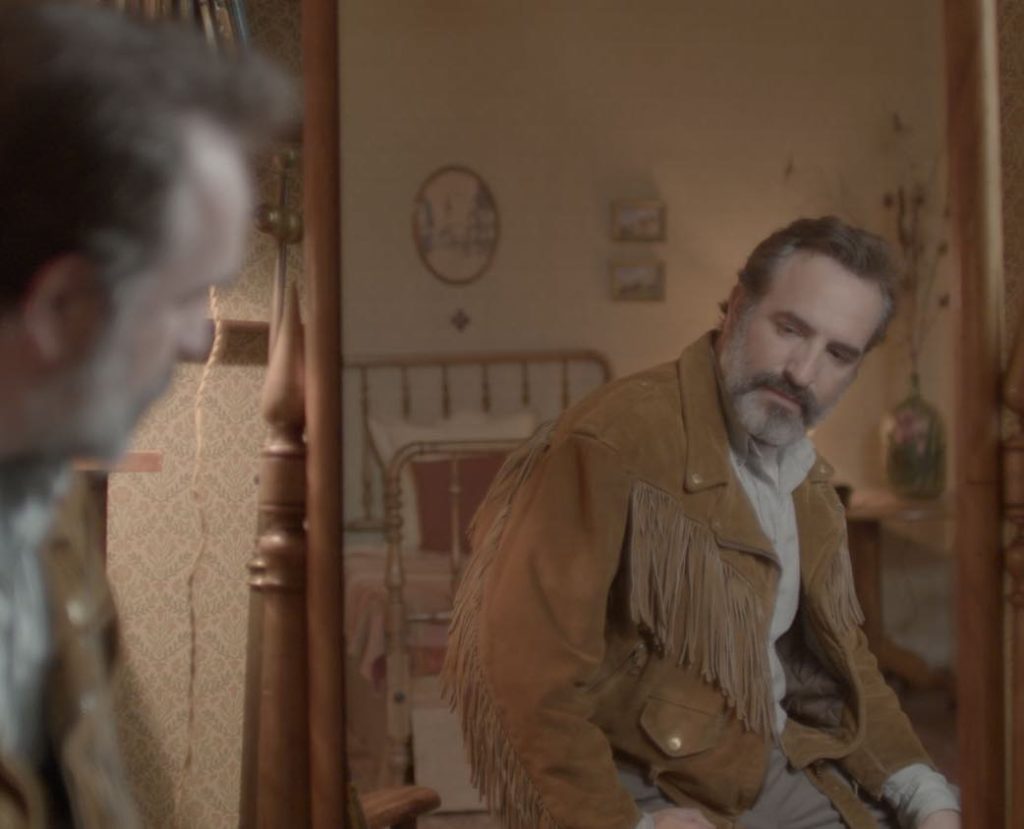
When a French movie is described as a “comedy” and has a July release date in Paris, it almost invariably means that (1) it’s a generic film about a chaotic summer holiday with families/groups of mature male friends/bands of teens behaving disgracefully, and (2) it’s not remotely funny. Accordingly, I went to see the new comedy Le Daim (Deerskin) in a state of trepidation, relieved to know that even if it was a hellish experience, the torture would only last for one hour and 17 minutes.
Le Daim, directed by Quentin Dupieux and starring Jean Dujardin (of The Artist fame), turns out to be something altogether different than the usual mediocre summer fare. It is infinitely stranger, more anguished and funnier, and is – dare I say it? – a masterpiece.
The central character, Georges (Dujardin at the top of his game), arrives on screen with almost no backstory: all we learn about him is that he has left his wife and job and is driving to the Pyrenees.
On the way, he stuffs his corduroy jacket down the toilet of a service-station washroom and buys an ill-fitting fringed deerskin jacket for an outrageously high price, then checks into a small-town hotel. The man who sold him the jacket had also given him a free digital camcorder, which allows him to pose as a filmmaker in the town.
The new jacket would seem to symbolize Georges’s desire to start his life anew, but it immediately takes on a bizarre importance and personality of its own. Georges starts filming it with his camera and even gives the jacket its own voice.
We quickly realize that Georges is a man in the grip of a severe mental breakdown, and, even more worryingly, is a psychopath in the making.
His one abiding fixation becomes the elimination, at all costs, of every other jacket in the world. With the help of Denise (Adèle Haenel), a bartender whose dream is to become a movie editor, he starts filming members of the local community (who think they are starring in his film) as they throw away their own jackets at his behest.
Spoiler alert: skip this paragraph if you prefer not to know certain plot details. Dupieux manages to portray the townspeople as both utterly ordinary and deeply weird. As Georges accumulates more deerskin items (hat, trousers, gloves) and starts murdering anyone wearing a jacket, the body count increases. Each death seems to remain undiscovered and uninvestigated as he continues his killing spree. Plausibility has no place in this cinema of the absurd.
Apart from everything relating to his coat, Georges also films the wild deer in the area. Dupieux is clearly fascinated by the relation between animal and commodity and by the disconnect between material objects and the living creatures from which they are made.
The movie is also a meditation upon the filmmaking process: the director’s obsessions and the ambitions of those who will do anything to work or act in films. It cannot be a coincidence that Dujardin, who has gained a few extra pounds and a beard for the role, looks disconcertingly like the director himself.
After such an extraordinary movie, it is difficult to look at the ordinary world in the same way. When my friend and I left the cinema, the streets and the people of Paris seemed a whole lot more peculiar than they had an hour and 17 minutes earlier.
Note to readers: Deerskin has just been released in the UK. Click here to read an interview with director Quentin Dupieux.
Favorite
Thanks. It is in Cambridge and your review will send me right to the cinema!